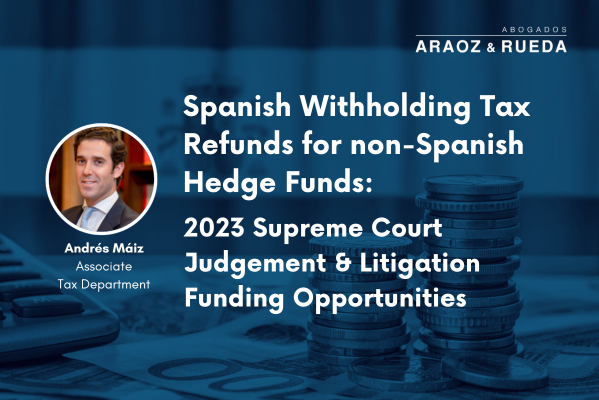The Spanish Supreme Court issued landmark rulings confirming that Spain’s withholding tax (WHT) regime for dividends paid by Spanish listed companies to non-Spanish hedge funds violates the fundamental EU principle of the free movement of capital (Article 63 TFEU). Historically, non-Spanish hedge funds assumed a higher WHT burden than comparable Spanish collective investment undertakings due to the absence of specific domestic provisions allowing for equivalent taxation. These judgments pave the way for non-Spanish hedge funds to claim WHT refunds.
The Court has established a clear two-step process for addressing such claims. First, it must be verified if the non-Spanish hedge fund is indeed comparable to a Spanish collective investment undertaking. Recognizing the lack of harmonized regulation for non-Spanish hedge funds, the Supreme Court clarified that this comparability analysis should not be based on a rigid application of Spanish domestic law’s exact requirements, but rather on a holistic consideration of its purpose, subject matter, and content.
The specific elements that have to be verified to confirm the comparability, which have been identified for the first time, are the following:
1.- Open-ended Nature: The non-Spanish hedge fund must be genuinely accessible to the public, distinguishing it from private portfolio entities or those restricted to specific groups (e.g., company employees). This nature is not undermined if the access is limited to professional/qualified investors or to a minimum investment amount. To ascertain this, the Court considers:
a) Capital Raising: The fund must primarily raise external capital from the general public. This aligns with the Spanish tax system’s goal of facilitating broad investor access to diverse investments, preventing double taxation, and ensuring tax parity with direct investments. Critically, hedge funds must not be mere holding companies for personal wealth or restrict participation based on subjective criteria, but rather aim to serve the general public.
b) Fund Liquidity: Beyond mere public access, the Court emphasizes the liquidity of the fund’s units. While Spanish resident hedge funds may have more restricted liquidity than the UCITS Funds (e.g., minimum holding periods), the core principle for open-ended collective investment undertakings is the investor’s ability to request redemption of units, directly or indirectly, at a value closely aligned with their net asset value.
c) General Public Sourcing: It must be clearly demonstrated that the fund seeking comparability obtains resources or capital from the general public, without access limitations based on subjective reasons (e.g. solely for employees of a particular company).
2.- Authorization: The non-Spanish hedge fund must hold an authorization in force issued by the financial regulatory authorities overseeing such funds in its country of residence.
3.- Management: The non-Spanish hedge fund must be managed by an entity authorized in its country of residence as an Alternative Investment Fund Manager (AIFM) under Directive 2011/61/EU.
The burden of proof corresponds to the non-Spanish hedge funds. However, if the requirements detailed above are proved, the burden is transferred to the Spanish Tax Authorities.
Additionally, the neutralization of the discriminatory treatment through the application of a convention for the avoidance of double taxation will only be deemed as met when it allows deducting the taxation borne in Spain in its State of residence.
Strategic opportunity for refunds
Non-Spanish hedge funds that have suffered WHT exceeding 1% on dividends received from Spanish listed entities may be entitled to claim a refund of the excess, provided the comparability requirements are met.
In light of the Supreme Court judgments, affected hedge funds should proactively assess their eligibility and consider initiating refund procedures. Litigation funding solutions may offer an effective means of mitigating legal cost exposure, enabling funds to pursue claims with minimal upfront financial risk in exchange for a success-based fee.
Contact us to evaluate your fund’s eligibility, explore financing options, and navigate the Spanish tax refund process with confidence and clarity.
By Andrés Máiz
Senior Associate – Tax Department





